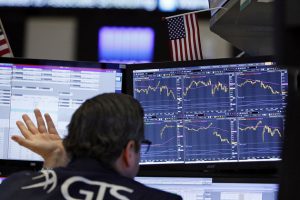By Business A.M.
- ANALYST INSIGHT: CORONATION
Recent weeks have seen inflationary expectations in the US ease, with the result that US bond yields have moderated, and US equity markets have enjoyed support. For Nigeria, this means that in several specific areas, things are likely to get better. Nigeria is connected to global markets in several ways. The first is, obviously, the oil price which directly influences the value of Nigeria’s principal export, the level of its foreign exchange reserves, and – to a large extent – government funding. The news here is good, with the oil price recovering recently. Another strong connection is between US dollar government bond yields and the yields of Nigerian Eurobonds issued by the Federal Government (FGN). As US government bond yields move upwards there are fewer reasons to buy non-investment grade Nigerian Eurobonds, so FGN Eurobond yields rise sharply. But as US government bond yields moderate, the opposite happens.
During 2022, and as the 2-year US government bond yield rose from 0.73% to 4.43% (+369bps), the yield of a FGN 2025 Eurobond (to take one example) rose from 5.60% to 10.2% (+460bps). This kept Nigeria out of the Eurobond market as issuing fresh debt was too pricey. The good news is that the upswing in US policy rates appears to be limited to a further 25bps rise in May (to an upper band of the policy target range of 5.25%) and that US bonds rates imply a fall in the policy rate later this year. This suggests that, as a knock-on effect, FGN bond rates themselves are likely to moderate, the more so if US dollar investors turn away from US government bonds later this year and look for juicier yields abroad. There is even the possibility, perhaps not in 2023 but in 2024, that FGN Eurobond rates will fall to the point where it becomes possible for Nigeria to issue Eurobonds again. A downward trajectory in Nigeria’s US dollar yields is extremely important to the nation’s banks and companies because the FGN Eurobond yield is frequently referenced in private-sector US dollar loans.
The influence of policy rates
Naira policy rates do not correlate with international policy rates most of the time, but 2022 was a year when they did. As global inflation trended upwards the CBN became concerned about the effects of global inflation on Nigerian inflation (i.e. imported inflation) and started raising its Monetary Policy Rate (MPR). This was soon transmitted into market interest rates, which was costly for borrowers but good news for savers and generally good news for banks as their net interest margins increased.
If, as the US bond market expects, inflationary pressures in the US ease this year, then this is likely to ease imported inflation in Nigeria. The issues here, however, are whether imported inflation really is the key driver of inflation in Nigeria and whether raising Nigeria’s policy rate is going to tame inflation. For the time being inflation in Nigeria appears sticky with March inflation reported at 22.04% year-on-year against 21.91% year-on-year in February.
For the most part, developments in US policy rates and its bond markets are positive for Nigeria, in our view. There are some important caveats, however. The first is that financial shocks in the US (such as the collapse in Silicon Valley Bank in March) and Europe (the collapse of Credit Suisse in March) may not be over. Although the effects of such crises on Nigeria are very small, another crisis in the US or Europe could make international investors risk-averse again, meaning they would think twice before buying Nigerian Eurobonds. On balance, we do not think that a repeat of March’s crises in the US and Europe is likely.
A more potent risk is that the global interest rates (not just those of the US also but also those of other great trading blocks like Europe and China) may not return to the extremely low levels seen during the last decade. In fact, policymakers may accept a slightly higherinflation rate than before and therefore maintain higher interest rates than before. The days of zero, or near-zero rates in developed markets may be over, with the implication that emerging market US dollar bond rates will trend higher than they have in the past.
It is helpful that Nigeria has avoided the pitfalls of excessive borrowing in foreign currencies suffered by several developing and emerging market nations in recent months (think: Ghana; Pakistan; Sri Lanka; Turkey). The election of a new government, following general elections in February, means that the policy outlook is uncertain, so we need to be attuned for future ministerial appointments and announcements to see whether Nigeria’s current policy trajectory is to be broadly continued or, possibly, radically changed.
The influence of global markets on Nigeria in 2023 is set to be much better than in 2022, we believe. And it is important to appreciate that elevated bond rates attract new investors, as we explain in Coronation Research Investment Outlook – Better times in 2023, 11 Jan 2023. If global conditions continue to improve then the implications for oil prices, Nigerian Eurobonds and the cost of borrowing in US dollar are all good.








